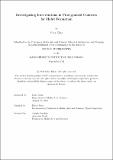Investigating Interventions in Fine-grained Contexts for Habit Formation
Author(s)
Khan, Mina
DownloadThesis PDF (46.62Mb)
Advisor
Maes, Pattie
Terms of use
Metadata
Show full item recordAbstract
Behavior change is important, yet hard to sustain. Habits are automatic responses to specific contextual cues, and can help sustain behavior change. Fine-grained specific contexts are commonly used in habit formation, but interventions in automatically-detected fine-grained contexts have rarely been explored for habit formation.
We investigate habit-formation using interventions in fine-grained mobile, physical-world and digital, computer-based contexts, making three key contributions for each: a survey to identify behavior change needs, a prototype system designed to deliver fine-grained context-specific interventions, and a study to investigate habit-formation using interventions in fine-grained contexts, compared to interventions in less fine-grained contexts. We use the Self-report Habit Index (SRHI) and Self-Report Behavioral Automaticity Index (SRBAI) to measure habit formation and habit automaticity, respectively.
For mobile, physical-world behavior change, the survey of needs (N=53 participants) indicated that participants want diverse and personalized behavior change support in diverse and specific contexts. We created a wearable device with on-device deep learning for interventions in personalized and privacy-preserving egocentric visual contexts. In a 4-week pilot study (N=10), interventions in egocentric visual contexts led to more percentage increase in average habit formation (SRHI) and automaticity (SRBAI) than interventions in coarse-grained contexts based on time, geolocation, and physical activity. The percentage increase in median habit formation was also more for the fine-grained egocentric context group, whereas the percentage increase in median habit automaticity was similar between the two groups. For both groups, the habits persisted in the post-study evaluations 1 and 10 weeks later, without interventions.
For computer-usage behavior change, the survey of needs (N=68) indicated that participants want to reduce excessive/unnecessary use, e.g., social media, and found off-the-screen breaks helpful. We created a Chrome extension to deliver interventions based on specific web activities, and conducted a 6+2-week study (N=31, 6 weeks of interventions and 2 weeks of post-study without interventions). After 6 weeks, interventions in fine-grained website-entry-based contexts led to more percentage increase in mean and median habit formation and automaticity than interventions in coarse-grained interval-based or random contexts. After the additional two-week post-study, without interventions, the website-entry group had the largest percentage increase in mean SRHI/SRBAI, whereas the interval-based group had the largest percentage increase in median SRHI/SRBAI.
Qualitative results from both studies indicated that interventions in fine-grained contexts were delivered at more opportune moments and were less disruptive. We discuss the limitations of our research and present a first step towards investigating interventions in fine-grained contexts for habit formation, potentially for sustainable behavior change, without long-term dependence on technology.
Date issued
2024-09Department
Program in Media Arts and Sciences (Massachusetts Institute of Technology)Publisher
Massachusetts Institute of Technology